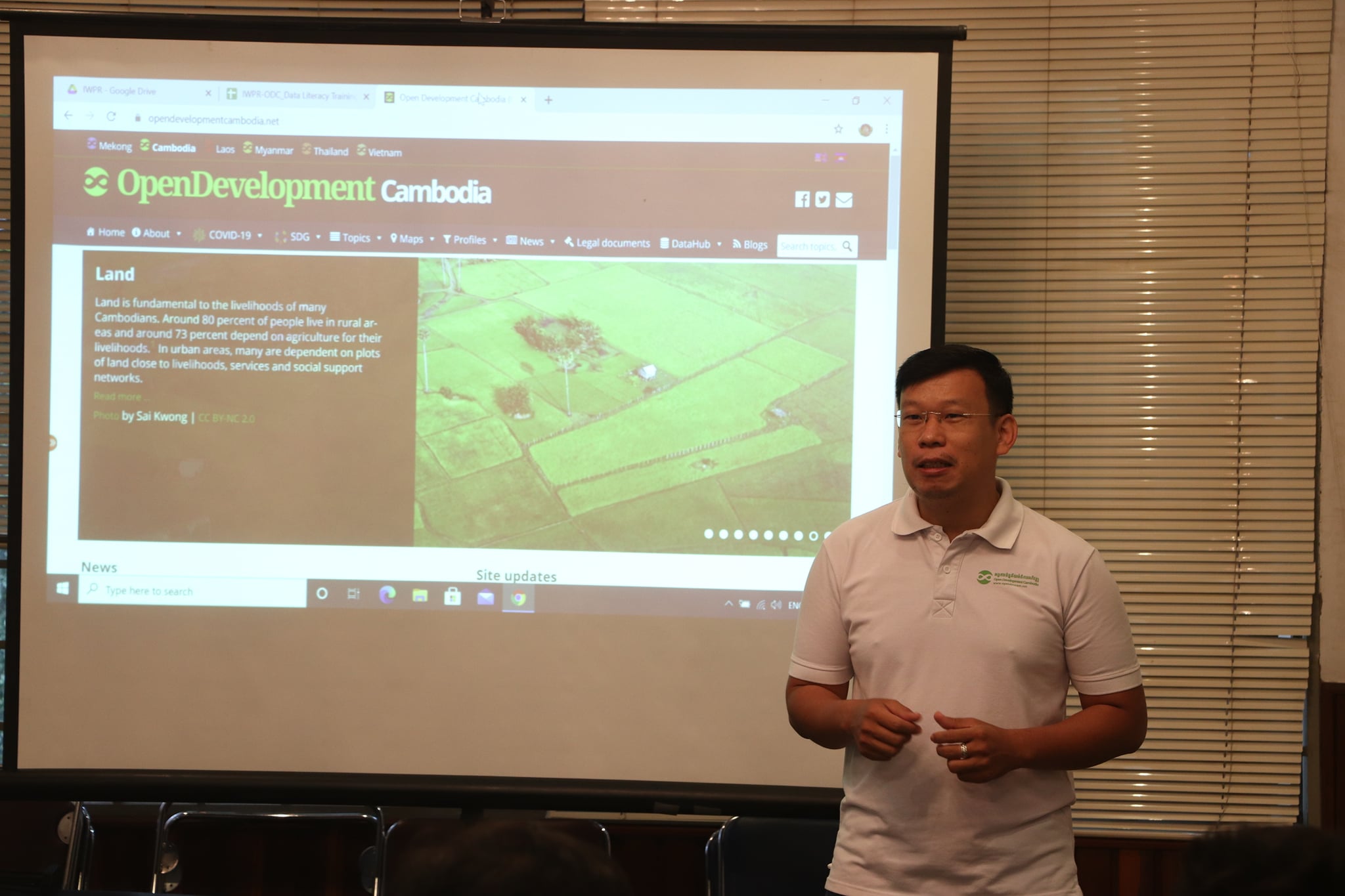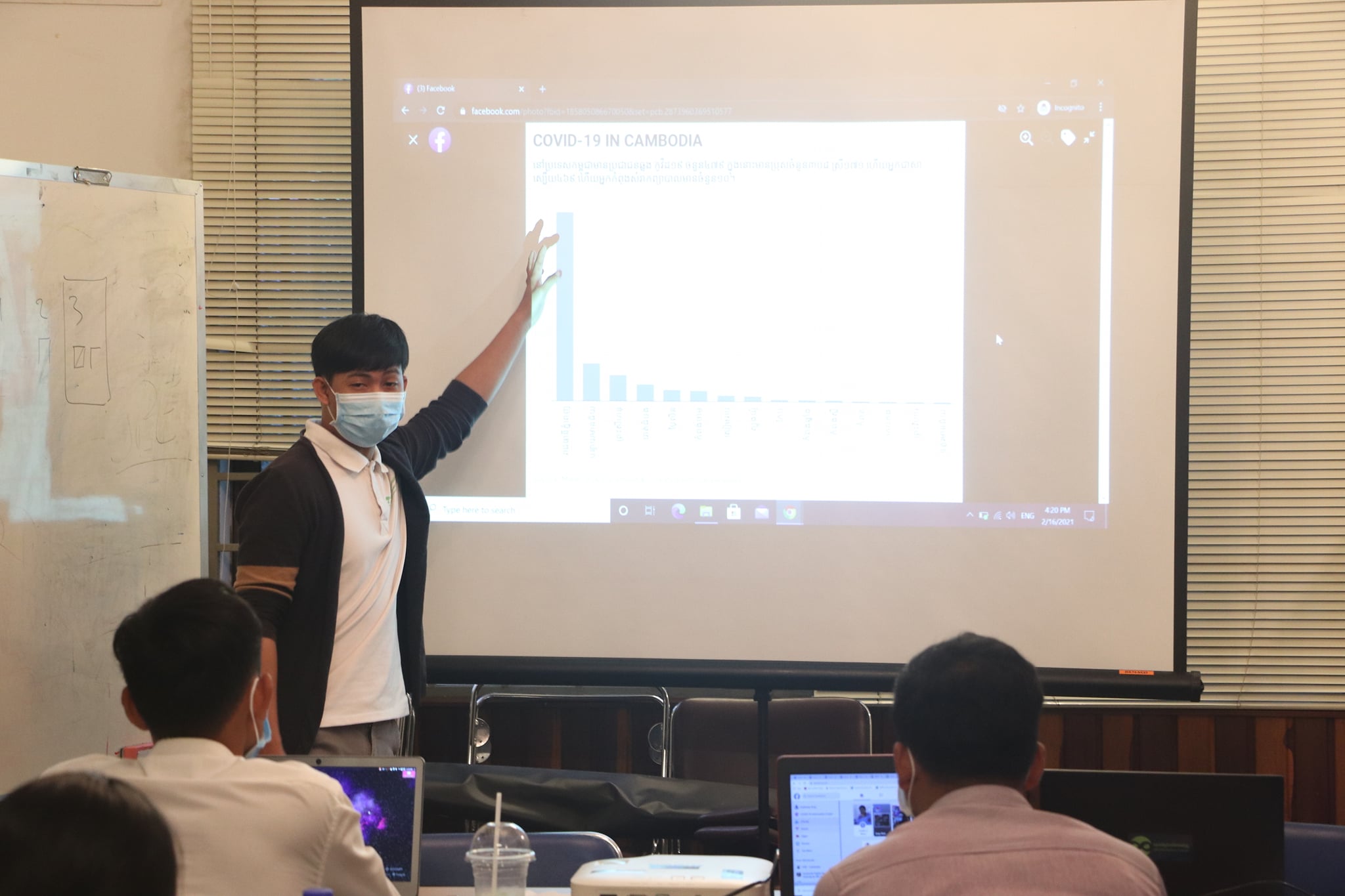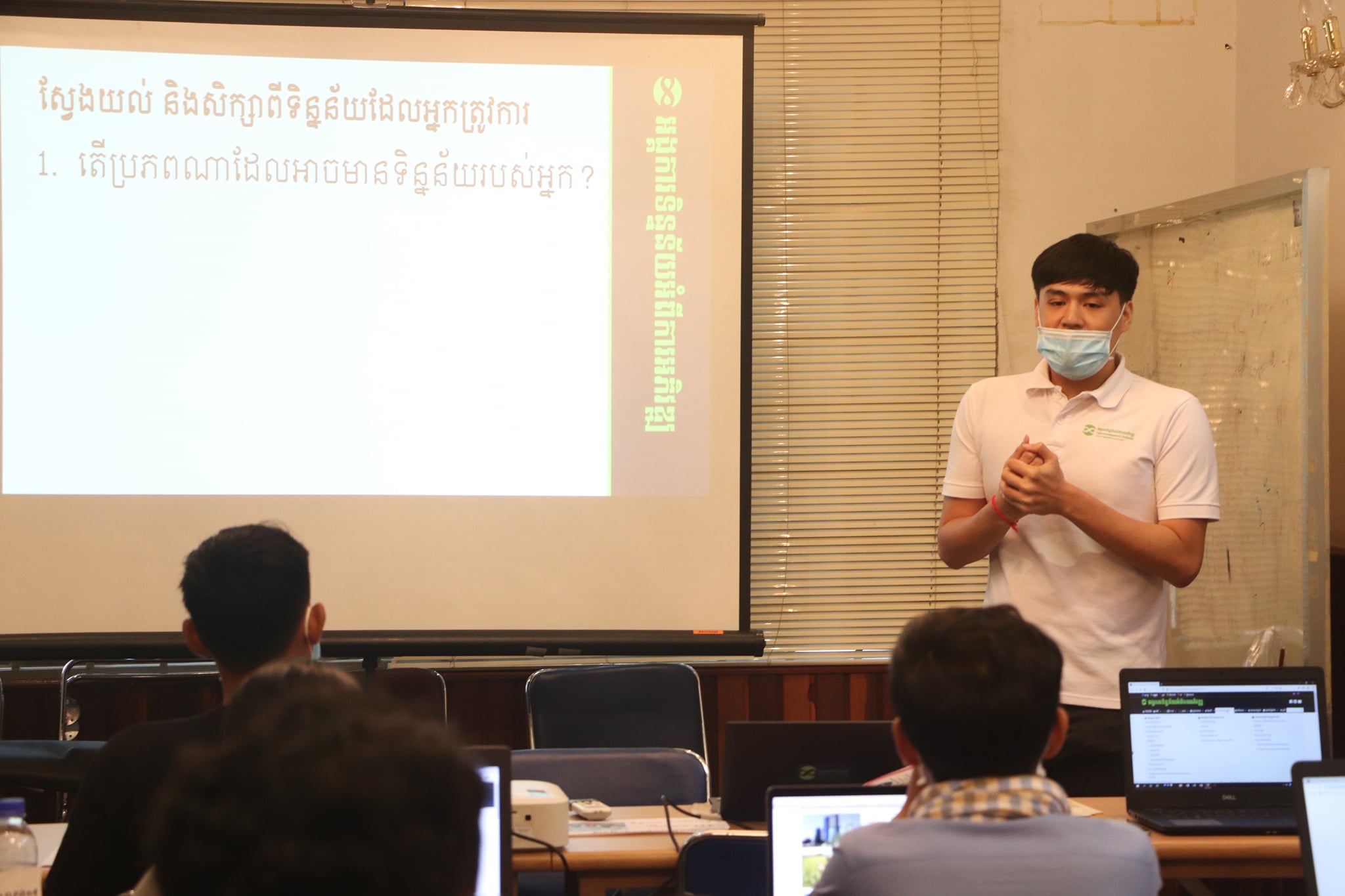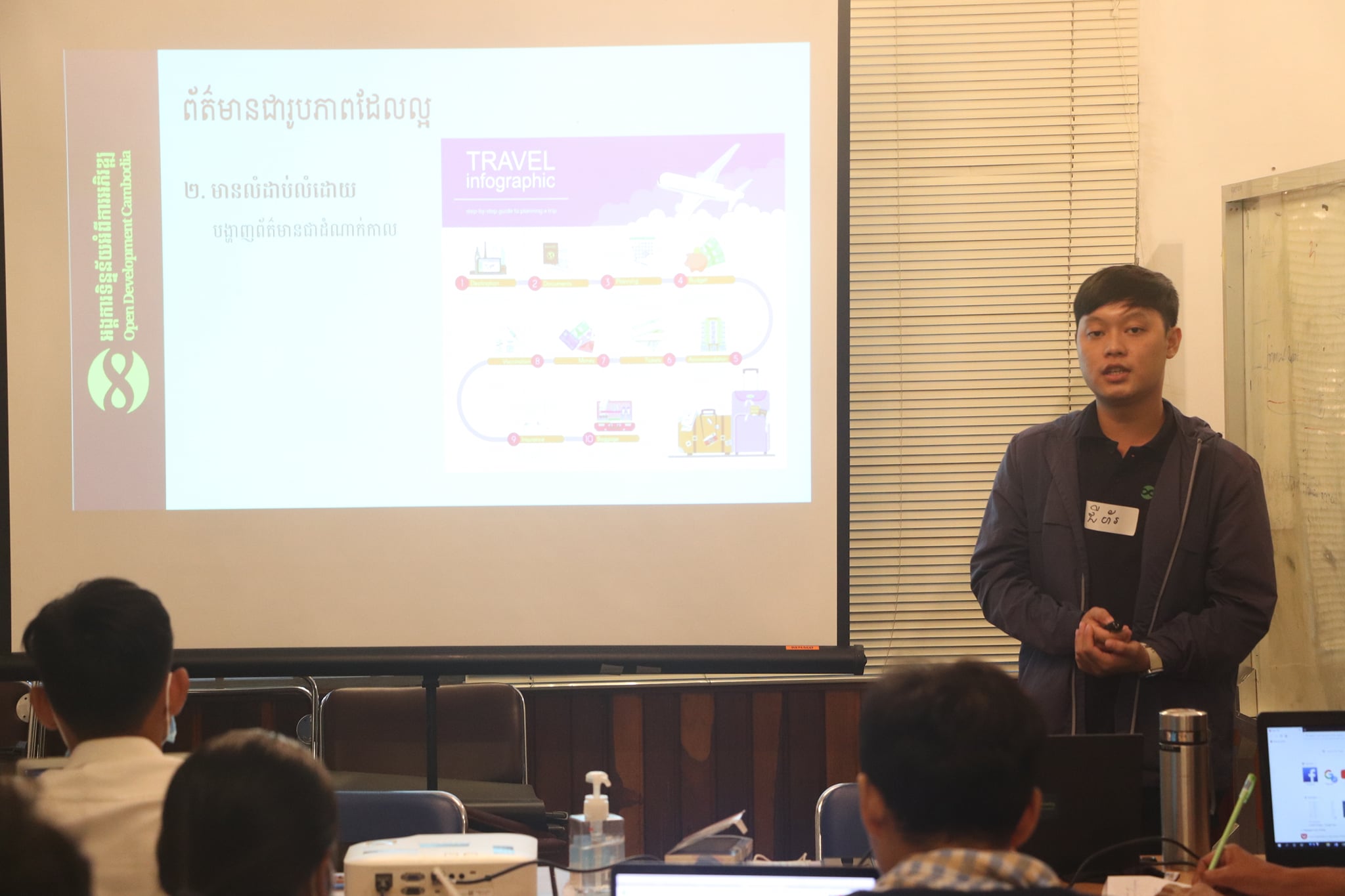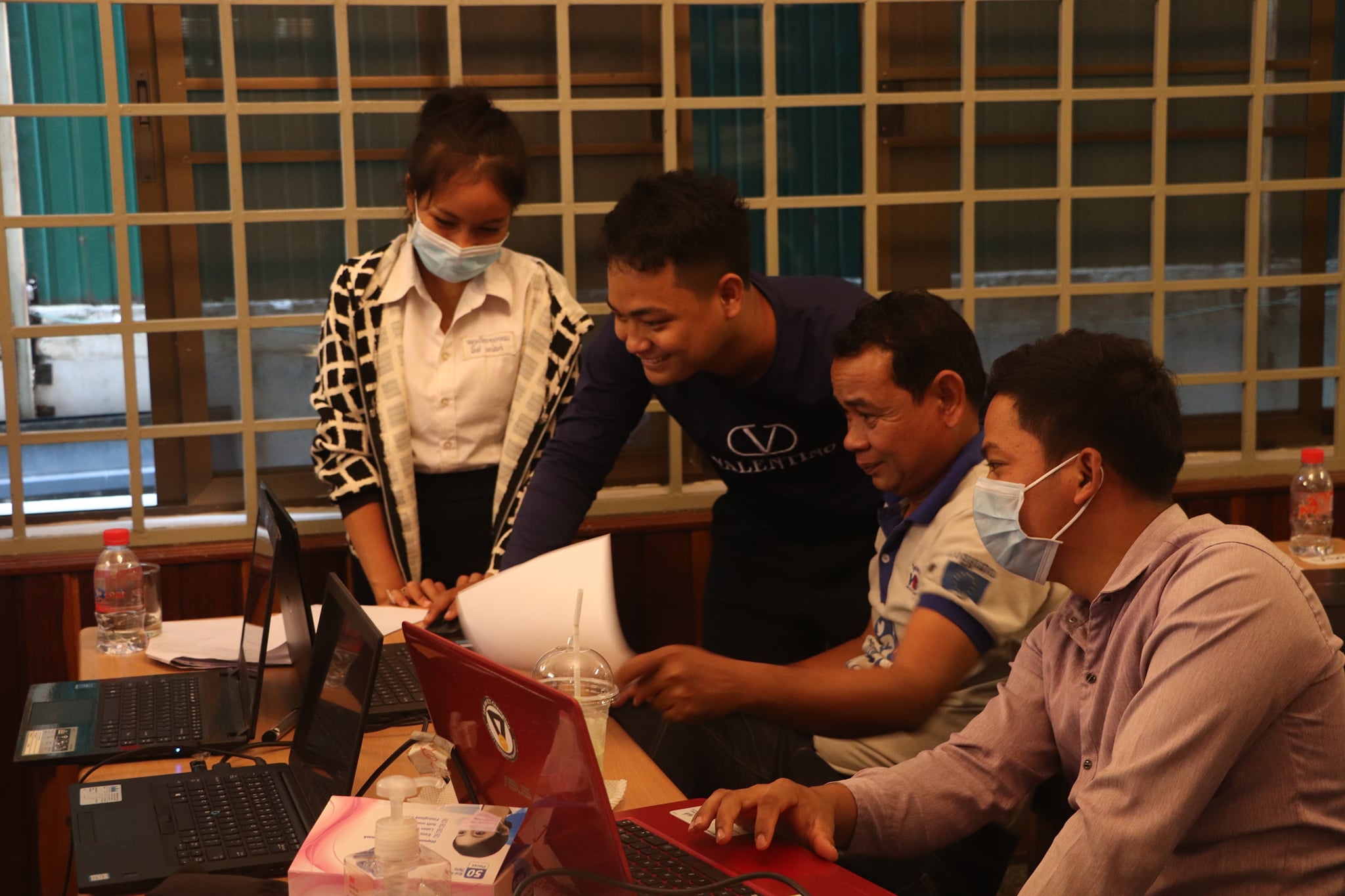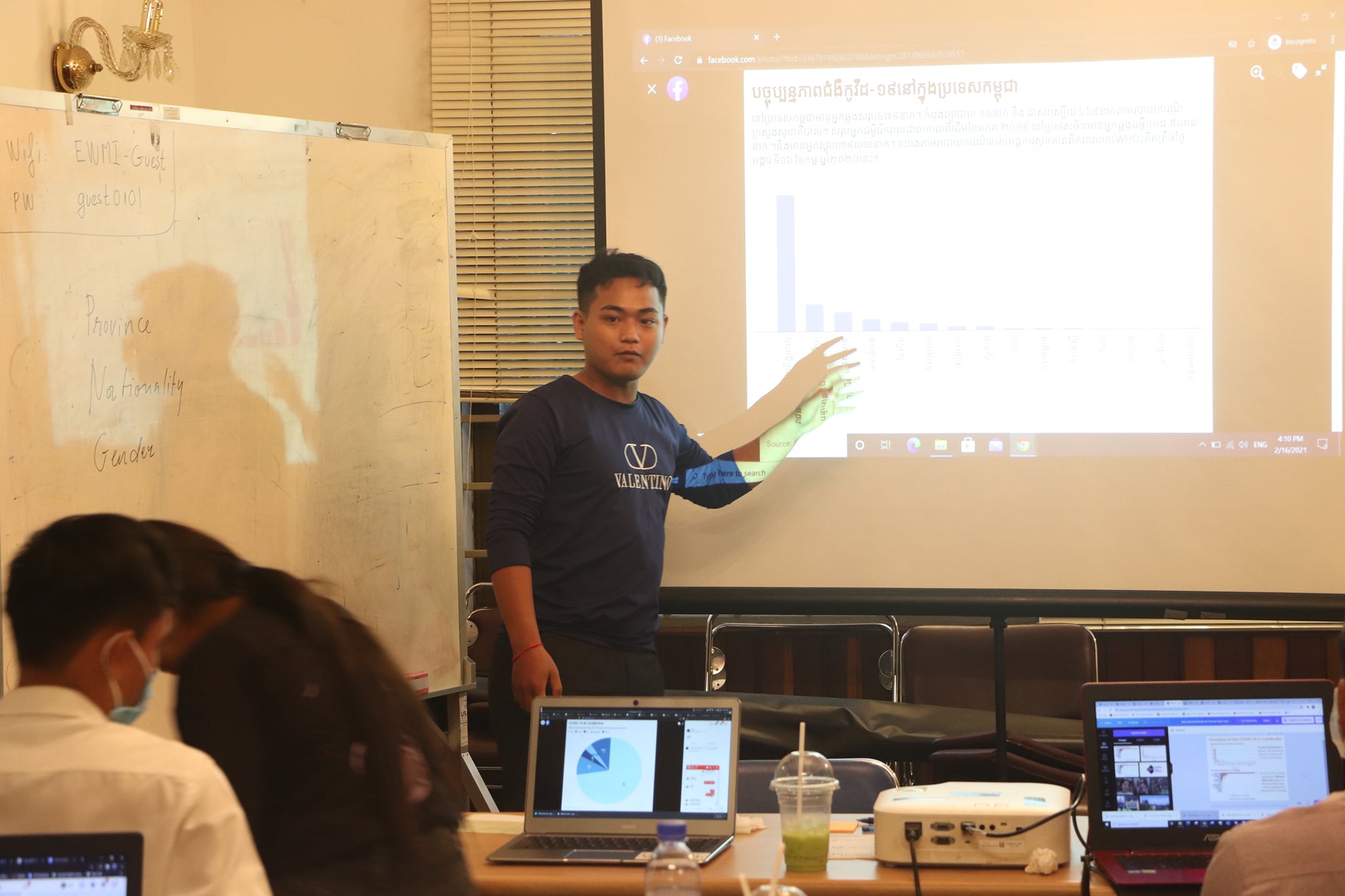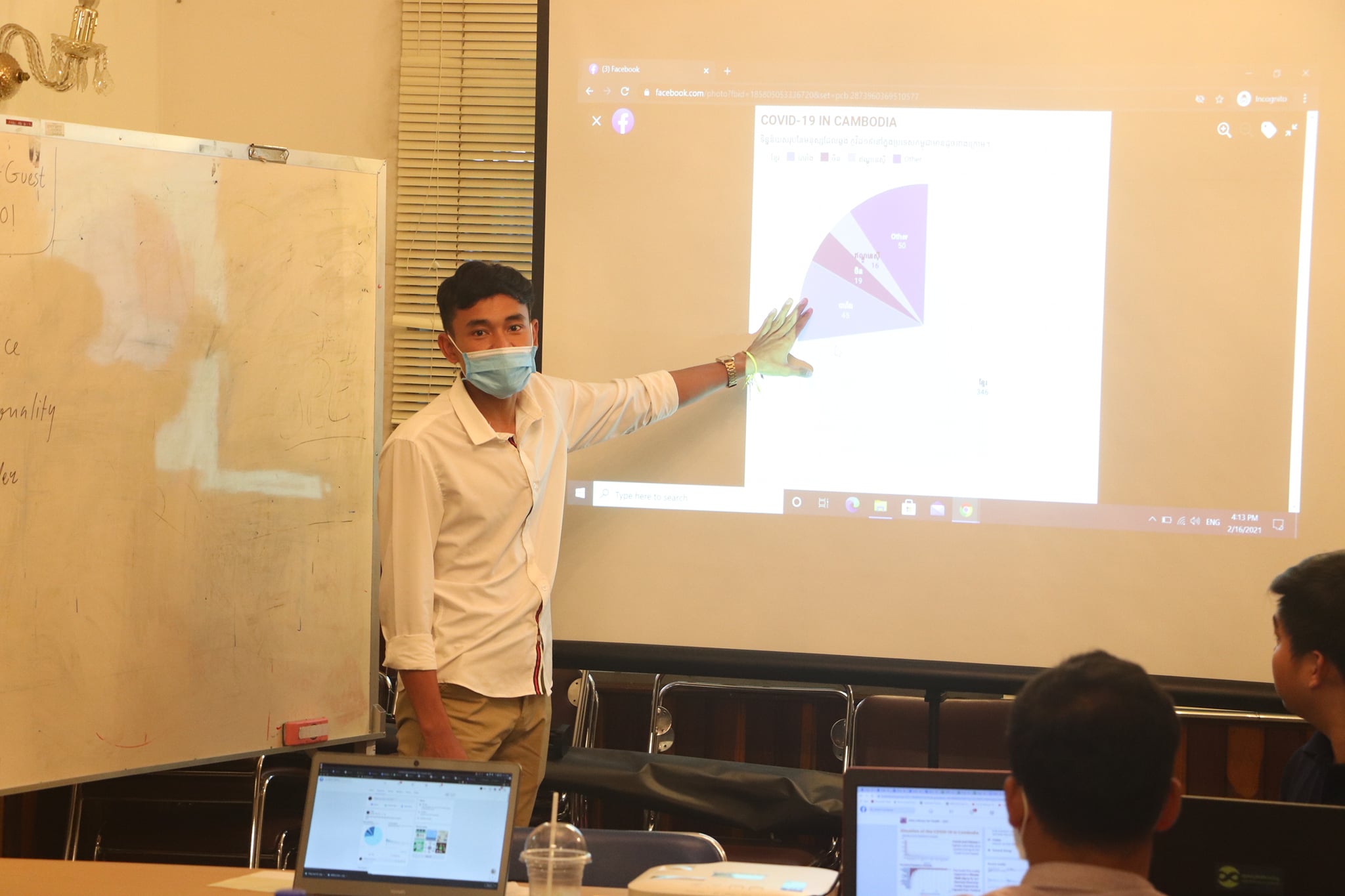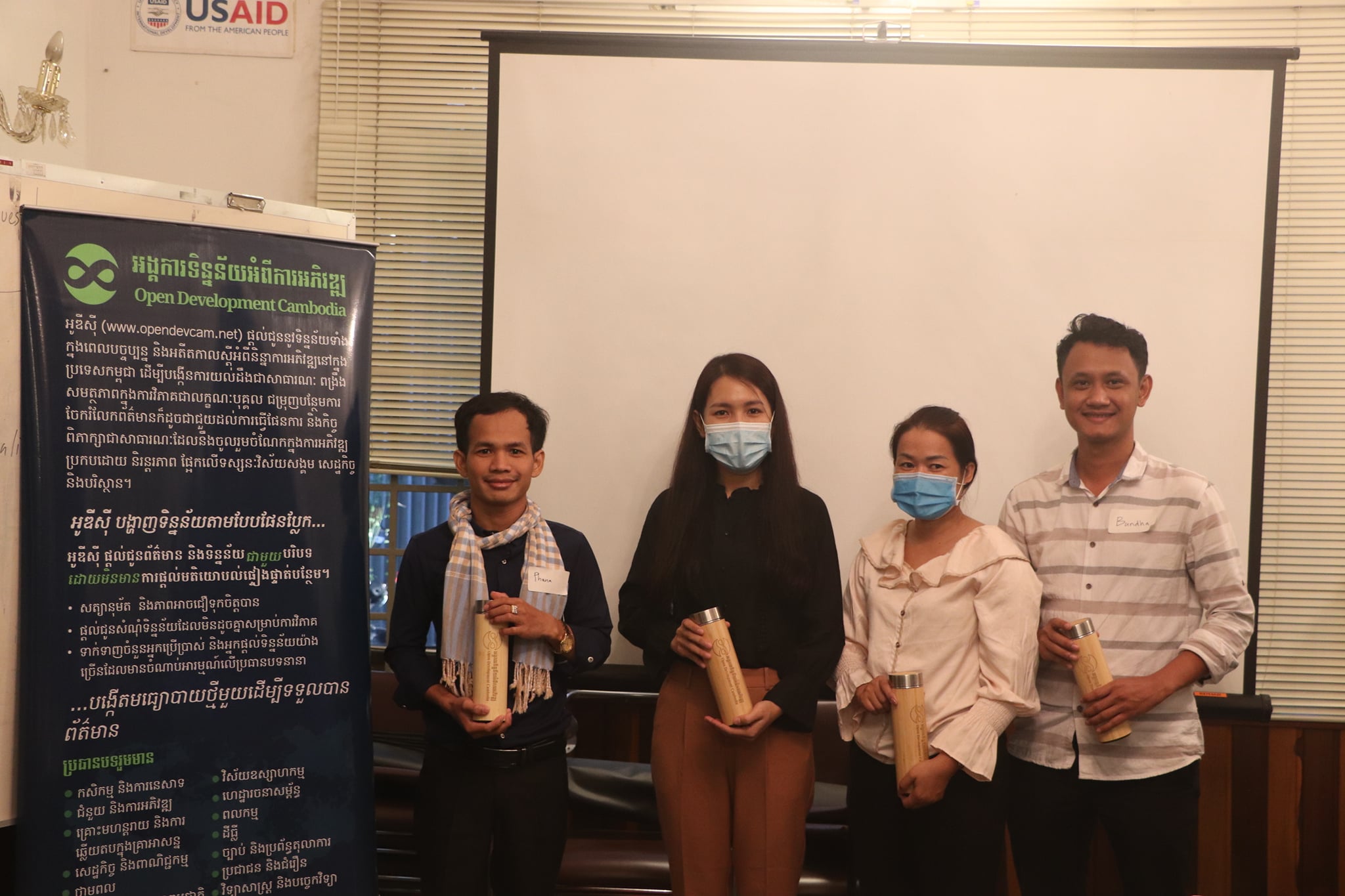វគ្គបណ្តុះបណ្តាលស្តីអំពីអក្ខរកម្មទិន្នន័យទៅលើប្រធានបទសុខភាពសាធារណៈ
នៅថ្ងៃទី ១៥-១៦ ខែកុម្ភៈ ឆ្នាំ២០២១ អង្គការទិន្នន័យអំពីការអភិវឌ្ឍ (ODC) បានធ្វើសិក្ខាសាលាបណ្តុះបណ្តាលស្តីអំពី «អក្ខរកម្មទិន្នន័យទៅលើប្រធានបទសុខភាពសាធារណៈ» ប្រកបដោយជោគជ័យ។ វគ្គបណ្តុះបណ្តាលនេះត្រូវបានរៀបចំឡើងនៅការិយាល័យអូឌីស៊ីក្នុងរាជធានីភ្នំពេញ ដោយមានអ្នកចូលរួមចំនួន ១១ នាក់ដែលមកពីមជ្ឈដ្ឋានផ្សេងៗគ្នា រួមមានអ្នកសារព័ត៌មានពលរដ្ឋ មន្ត្រីអភិវឌ្ឍន៍គម្រោង មន្ត្រីខាងស្រាវជ្រាវ និងនិស្សិតនៃសាកលវិទ្យាល័យ ដែលក្នុងនោះមានអ្នកចូលរួម ០៥ នាក់ជាស្ត្រី។ ការបណ្តុះបណ្តាលដែលមានរយៈពេល ០២ ថ្ងៃនេះ អាចធ្វើទៅបានដោយមានការគាំទ្រជំនួយពី US State Department តាមរយៈវិទ្យាស្ថាន Institute for War and Peace Reporting (IWPR) ក្រោមគម្រោង «ឃ្លាំងព័ត៌មានឌីជីថលអំពីកូវីដ-១៩ ដើម្បីប្រមូលផ្តុំព័ត៌មានក្នុងប្រទេសកម្ពុជា»។
គោលដៅសំខាន់នៃសិក្ខាសិលាបណ្តុះបណ្តាលអក្ខរកម្មទិន្នន័យទៅលើប្រធានបទសុខភាពសាធារណៈនេះ គឺជំរុញវប្បធម៌នៃការប្រើប្រាស់ទិន្នន័យនៅកម្ពុជាទូលំទូលាយ ក្នុងការលើកកម្ពស់ទៅលើការវិភាគផ្អែកលើភស្តុតាង និងយុទ្ធសាស្ត្រដោយផ្អែកលើការប្រើប្រាស់ទិន្នន័យដើម្បីដោះស្រាយបញ្ហាសុខភាពសាធារណៈ។ ដោយផ្តោតទៅលើគោលដៅទាំងនេះ វគ្គបណ្តុះបណ្តាលត្រូវបានរៀបចំឡើងជាពិសេសដល់អ្នកចូលរួម ដើម្បីឲ្យពួកគេមានសមត្ថភាពក្នុងការស្វែងយល់ឲ្យកាន់តែច្បាស់អំពីទិន្នន័យ និងប្រើប្រាស់វាយ៉ាងស្ទាត់ជំនាញនៅក្នុងការងារប្រចាំថ្ងៃរបស់ពួកគេ។ សិក្ខាសាលានេះផ្តោតលើជំនាញក្នុងការស្វែងរក ការសម្អាត និងការធ្វើទស្សនីយកម្មទិន្នន័យ ជាពិសេសទាក់ទងនឹងជំងឺកូវីដ-១៩ នៅក្នុងប្រទេសកម្ពុជា។ លើសពីនេះទៅទៀត វគ្គបណ្តុះបណ្តាលនេះក៏មានគោលបំណងឲ្យអ្នកចូលរួមមានសមត្ថភាពដាក់បញ្ចូលទិន្នន័យទៅក្នុងការសរសេរពីព្រឹត្តិការណ៍ ឬរឿងរ៉ាវផ្សេងៗដែលអាចឈានដល់ការផ្សព្វផ្សាយទៅសាធារណៈកាន់តែទូលំទូលាយ។
វគ្គបណ្តុះបណ្តាលនេះត្រូវបានចាប់ផ្តើមដោយមានសុន្ទរកថាបើកពី លោក ធី ទ្រី ដែលជានាយកប្រតិបត្តិនៃអង្គការអូឌីស៊ី។ នៅក្នុងសុន្ទរកថានេះដែរ លោកបានគូសបង្ហាញពីតួនាទីសំខាន់នៃទិន្នន័យ និងវិធីសាស្ត្រដែលអាចត្រូវបានប្រើដើម្បីផ្សព្វផ្សាយព័ត៌មានទៅដល់សាធារណជន។ ក្នុងន័យនេះ លោកក៏បានលើកឡើងអំពីសក្តានុពលនៃការប្រើប្រាស់ទិន្នន័យនៅក្នុងវិស័យសុខភាពសាធារណៈ ជាពិសេសក្នុងបរិបទបច្ចុប្បន្ននៃជំងឺរាតត្បាតសកលកូវីដ-១៩។ លោកបានបន្ថែមទៀតថា តាមរយៈការទទួលបានជំនាញក្នុងការស្វែងរក ការសម្អាត និងការធ្វើទស្សនីយកម្មពីទិន្នន័យ អ្នកចូលរួមនឹងអាចមានសមត្ថភាពសរសេរអត្ថបទដោយផ្អែកលើទិន្នន័យដោយខ្លួនឯងបានក្នុងរបៀបមួយដែលមានលក្ខណៈគួរឲ្យទុកចិត្តបាន និងមានភាពទាក់ទាញជាងមុន។
បន្ទាប់ពីសុន្ទរកថារបស់នាយកប្រតិបត្តិ កិច្ចបន្ទាប់នៅក្នុងវគ្គទី ១ លោក ហៀង កុសល ដែលជាអ្នកស្រាវជ្រាវខាងសេដ្ឋកិច្ចនៃអង្គការអូឌីស៊ីបានចូលធ្វើបទបង្ហាញ។ នៅក្នុងវគ្គដំបូងនេះ លោកបានបង្ហាញមូលដ្ឋានគ្រឹះអំពីទិន្នន័យ ដូចជាប្រភេទនៃទិន្នន័យ និយមន័យនៃទិន្នន័យបើកចំហ និងសារៈសំខាន់របស់វា ក៏ដូចជាវដ្តនៃតម្លាភាពផ្អែកលើទិន្នន័យបើកចំហ។ បន្ទាប់មក លោកបានភ្ជាប់ចំណេះដឹងទាំងនេះទៅនឹងទិដ្ឋភាពពិតជាក់ស្តែង ដោយលោកបានបង្ហាញនូវឧទាហរណ៍មួយចំនួននៃព័ត៌មានដែលមានផ្ទុកនូវទិន្នន័យផ្សេងៗ។ គោលបំណងនោះ គឺដើម្បីពង្រឹងសមត្ថភាពរបស់អ្នកចូលរួមក្នុងការបែងចែកនូវអ្វីដែលជាព័ត៌មានដែលងាយស្រួលសម្រាប់អ្នកអាន និងអ្វីដែលមិនងាយស្រួលសម្រាប់អ្នកអាន ក៏ដូចជាយល់ដឹងពីសារៈសំខាន់នៃព័ត៌មានដោយផ្អែកលើទិន្នន័យផងដែរ។
បន្ទាប់មកទៀត លោក បាន ចន្ទផល្លា ជាអ្នកស្រាវជ្រាវខាងផ្នែកសង្គមនៃអង្គការអូឌីស៊ី បានធ្វើបទបង្ហាញពីបច្ចេកទេសជាច្រើន ដែលត្រូវបានប្រើដើម្បីស្វែងរកទិន្នន័យលើប្រព័ន្ធអ៊ីនធឺណេត។ ក្រៅពីទទួលបានគន្លឹះក្នុងការស្វែងរកទិន្នន័យហើយ អ្នកចូលរួមក៏បានសិក្សាអំពីប្រភពទិន្នន័យថ្មីៗបន្ថែមទៀតដែលទាក់ទងនឹងប្រធានបទ។ នៅវគ្គបន្ទាប់ មានការបង្ហាញអំពីទម្រង់ទូទៅនៃទិន្នន័យ ដែលត្រូវបានធ្វើបទបង្ហាញដោយ លោក ឡុច កល្យាណ ជាអ្នកជំនាញស្រាវជ្រាវទិន្នន័យ និងGIS នៃអង្គការអូឌីស៊ី។ លោក កល្យាណ បានពន្យល់យ៉ាងពិស្តាអំពីទម្រង់នៃទិន្នន័យ ប្រភេទនៃឯកសារ ព្រមទាំងណែនាំពីកម្មវិធីកុំព្យូទ័រមួយចំនួនសម្រាប់បម្លែងទិន្នន័យ និងព័ត៌មានពីឯកសារ PDF ទៅជាទិន្នន័យដែលមានទម្រង់កំព្យូទ័រអាចអានបាន។
ខណៈដែលអ្នកចូលរួមទទួលបានចំណេះដឹងជាមូលដ្ឋានអំពីទិន្នន័យ មន្ត្រីស្រាវជ្រាវទិន្នន័យ និងGIS របស់អង្គការអូឌីស៊ី លោក វង្ស ពិសិទ្ធ បានផ្តល់វគ្គបច្ចេកទេសបន្ថែមទៀតស្តីពីជំនាញសម្អាតទិន្នន័យ។ លោក ពិសិទ្ធ បានសង្កត់ធ្ងន់លើសារៈសំខាន់នៃការយល់ដឹងអំពីស្តង់ដារនៃទិន្នន័យឲ្យបានត្រឹមត្រូវ ដែលជាតម្រូវការចម្បងមុននឹងការសម្អាតទិន្នន័យបានត្រឹមត្រូវសម្រាប់យកទៅវិភាគឲ្យកាន់តែស៊ីជម្រៅបន្ថែមទៀត។
ថ្ងៃទី ២ នៃកម្មវិធីបណ្តុះបណ្តាលបានចាប់ផ្តើមដោយ លោក ពិសិទ្ធ ណែនាំទៅលើទស្សនីយកម្មទិន្នន័យដោយផ្តោតលើឥទ្ធិពលដែលវាអាចប្រើក្នុងការចែករំលែករឿងរ៉ាវដែលមានលក្ខណៈស្មុគស្មាញទៅដល់អ្នកអាន។ លោកបានលើកឡើងពីសារៈសំខាន់នៃការជ្រើសរើសប្រភេទតារាងដែលត្រឹមត្រូវ និងពិនិត្យឡើងវិញនូវជំហានផ្សេងៗគ្នាដើម្បីបង្កើតទស្សនីយកម្មទិន្នន័យដោយប្រើ Datawrapper ដែលជាឧបករណ៍សម្រាប់ការធ្វើទស្សនីយកម្មទិន្នន័យតាមអ៊ីនធឺណេត។ នៅក្នុងវគ្គនេះ បានរួមបញ្ចូលទាំងការអនុវត្តផ្ទាល់ ដែលផ្តល់ឱកាសឲ្យអ្នកចូលរួមបានយកទ្រឹស្ដីមកអនុវត្តជាក់ស្ដែង ដែលទាក់ទងទៅនឹងបរិបទកូវីដ-១៩ នៅក្នុងប្រទេសកម្ពុជា។
លោក ង៉ូវ ជីហ័រ ជាមន្ត្រីផ្នែកទំនាក់ទំនងនៃអង្គការអូឌីស៊ី បានបន្តធ្វើបទបង្ហាញពីព័ត៌មានជារូបភាព (Infographic) ដែលជាជម្រើសមួយទៀតក្នុងការធ្វើទស្សនីយកម្មទិន្នន័យ។ នៅក្នុងនេះ គាត់បានណែនាំឧបករណ៍ប្រើក្នុងអ៊ីនធឺណេតមួយដែលមានឈ្មោះថា Canva ហើយលោកបានផ្តល់ដំបូន្មានលើការបង្កើតជារូបភាព ឬក្រាហ្វិកដែលបង្ហាញទិន្នន័យឲ្យកាន់តែច្បាស់លាស់ និងស៊ីជម្រៅ។ បន្ទាប់ពីបានរៀនពីរបៀបប្រើប្រាស់ឧបករណ៍នេះហើយ អ្នកចូលរួមបានធ្វើការអនុវត្តលើឧបករណ៍នេះ និងបានបង្កើតព័ត៌មានជារូបភាពរបស់ពួកគេរៀងៗខ្លួន។
ចំណុចដែលគួរឲ្យកត់សម្គាល់នៃវគ្គបណ្តុះបណ្តាលនេះ គឺសកម្មភាពជាក្រុមដែលអ្នកចូលរួមបានចេញកៅអីរបស់ពួកគេ ហើយអនុវត្តជំនាញ និងចំណេះដឹងដែលទទួលបានពីសិក្ខាសាលាជាក្រុម។ ក្រៅពីនេះ វាគឺជាឱកាសដ៏ល្អក្នុងការប្រាស្រ័យទាក់ទងជាមួយអ្នកចូលរួមដទៃទៀត និងផ្លាស់ប្តូរការយល់ដឹងរបស់ពួកគេលើទិន្នន័យស្ដីពីសុខភាពសាធារណៈ។ ក្នុងអំឡុងពេលនៃសកម្មភាពនេះ ក្រុមការងារអូឌីស៊ីក៏បានផ្តល់ការណែនាំ និងឆ្លើយសំណួរ និងដោះស្រាយបញ្ហាផ្សេងៗរបស់ក្រុមនីមួយៗនៅពេលដែលពួកគេបានបង្កើតទិន្នន័យស្ដីពីកូវីដ-១៩ ជាមួយជាក្រាប និងព័ត៌មានជារូបភាព។ វាពិតជាគួរឲ្យរំភើបណាស់ ដែលបានឃើញអ្នកចូលរួមខិតខំធ្វើការអនុវត្ត និងប្រើប្រាស់វិធីសាស្ត្រដែលបានរៀនរបស់ពួកគេ និងអនុវត្តលើជំនាញដែលទទួលបាន។ សមាជិកក្រុមទាំងអស់បានចូលរួមយ៉ាងពេញដៃពេញជើងក្នុងការពិភាក្សា និងចែករំលែកចំណេះដឹងផ្សេងៗជាមួយគ្នា។
ជារួម ការយល់ដឹងអំពីទិន្នន័យ និងជំនាញបច្ចេកទេសរបស់អ្នកចូលរួម ត្រូវបានសង្កេតឃើញថាមានភាពប្រសើរឡើងយ៉ាងខ្លាំងដោយសារលទ្ធផលនៃវគ្គបណ្តុះបណ្តាលនេះ។ ផ្អែកលើការវាយតម្លៃមុនពេលបណ្តុះបណ្តាល និងក្រោយ ក៏ដូចជាការសង្កេតកំឡុងពេលវគ្គបណ្ដុះបណ្ដាល អ្នកចូលរួមត្រូវបានមើលឃើញថាទទួលបានចំណេះដឹងយ៉ាងច្រើនអំពីការប្រើប្រាស់ទិន្នន័យ និងដឹងពីសក្តានុពលនៃការពិព៏ណនា ឬសរសេររឿងរ៉ាវផ្សេងៗ។ អ្នកចូលរួមបានរៀនអំពីការស្វែងរកទិន្នន័យដែលអាចជឿទុកចិត្តបានកាន់តែមានប្រសិទ្ធភាព ក៏ដូចជាការរៀបចំលំដាប់លំដោយនៃទិន្នន័យ និងការធ្វើទស្សនីយកម្មទិន្នន័យ។ បន្ថែមពីលើនេះ ពួកគេទទួលបានការយល់ដឹងអំពីការបញ្ចូលលេខ និងតួលេខដាក់វាទៅក្នុងសាច់រឿង ឬប្រធានបទរបស់ពួកគេ។ ជាកិច្ចចុងក្រោយ អ្នកចូលរួមបានស្នើឲ្យអង្គការ អូឌីស៊ី ផ្តល់ការបណ្តុះបណ្តាលដែលមានភាពស្រដៀងគ្នានេះទៅដល់អ្នកផ្សេងទៀតដែលកំពុងធ្វើការក្នុងវិស័យដូចគ្នានេះដែរ។ ក្រុមការងារ អូឌីស៊ី ពិតជាមានក្តីសោមនស្សរីករាយក្នុងការធ្វើការជាមួយក្រុមអ្នកចូលរួមដែលមានភាពសកម្មបែបនេះ ហើយទន្ទឹងរង់ចាំមើលពីលទ្ធផលនៃការសរសេររឿងរ៉ាវ ឬអត្ថបទដោយផ្អែកលើទិន្នន័យពីសំណាក់អ្នកចូលរួមទៅលើបញ្ហាពាក់ព័ន្ធនឹងកូវីដ-១៩ ក្នុងពេលឆាប់ៗនេះ។
